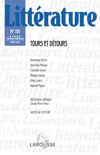
LITTERATURE
Scope & Guideline
Exploring the Depths of Literary Theory and Criticism.
Introduction
Aims and Scopes
- Psychoanalytic Critique of Literature:
The journal often explores the unconscious elements within texts, employing psychoanalytic theories to interpret literary works and their psychological underpinnings. - Ecocriticism and Environmental Perspectives:
A significant focus on ecocriticism reflects a growing interest in the intersection of literature and environmental studies, analyzing how literary texts engage with ecological themes. - Rhetorical Analysis and Historical Context:
The journal pays close attention to rhetorical strategies within literature, examining how historical contexts influence literary forms and genres. - Sociocriticism and Cultural Studies:
Investigating the social and cultural dimensions of literature, the journal integrates sociocritical approaches to understand how literature reflects and shapes societal values. - Interdisciplinary Approaches:
By incorporating perspectives from philosophy, history, and cultural theory, 'LITTERATURE' promotes a multifaceted understanding of literary texts.
Trending and Emerging
- Exploration of Identity and Subjectivity:
There is a noticeable trend towards examining themes of identity, particularly in relation to gender, race, and cultural belonging, highlighting the significance of diverse perspectives in literature. - Integration of Digital and Media Studies:
The journal is increasingly addressing the impact of digital media on literature, exploring how contemporary narratives intersect with technology and new forms of storytelling. - Contemporary Ecocritical Perspectives:
Emerging discussions on ecocriticism indicate a growing concern for environmental issues within literature, emphasizing the role of literature in addressing ecological crises. - Interrogation of Globalization and Transcultural Narratives:
A rising focus on globalization reflects a broader interest in how literature navigates cultural exchanges and the complexities of transnational identities. - Critical Engagement with Autofiction:
The exploration of autofiction as a genre is gaining traction, with scholars examining how personal narratives intersect with broader cultural and political contexts.
Declining or Waning
- Traditional Historical Literary Analysis:
There seems to be a reduction in purely historical analyses of literary texts, indicating a shift towards more contemporary and interdisciplinary approaches. - Focus on Canonical Texts:
The journal is moving away from a concentration on well-known canonical texts in favor of exploring lesser-known works and diverse literary voices. - Biographical Criticism:
Interest in biographical criticism appears to be waning, suggesting that contemporary scholarship is less focused on authorial intent and personal background in favor of structural and thematic analysis.
Similar Journals

JOURNAL OF MODERN LITERATURE
Fostering Innovative Critique in Modern LiteratureJOURNAL OF MODERN LITERATURE, published by Indiana University Press, is a distinguished peer-reviewed journal that delves into critical examinations of modern literary texts and theories. Since its inception, the journal has served as a vital platform for scholars dedicated to the exploration of contemporary literature, making significant contributions to the discourse within the field. With an impressive ranking of Q2 in the Literature and Literary Theory category as of 2023, it positions itself among the top-tier journals in its domain, reflecting its strong impact within academic circles. This journal not only fosters scholarly dialogue but also embraces innovative approaches to literary criticism, ensuring relevance in today’s dynamic cultural landscape. Researchers, professionals, and students will find a rich repository of articles that engage with various modern literary paradigms, enhancing their understanding and appreciation of the intricate relationships between literature and broader socio-cultural contexts. Though it does not operate under an open access model, the journal's extensive reach through its digital ISSN (1529-1464) and print ISSN (0022-281X) allows for valuable insights to be disseminated to the appropriate audiences.

STUDI FRANCESI
Charting New Territories in Cultural DiscourseSTUDI FRANCESI, published by Rosenberg & Sellier, is an esteemed journal in the fields of Cultural Studies, History, and Literature and Literary Theory. With an ISSN of 0039-2944, this journal has been a significant contributor to scholarly discourse since its inception in 1967. Operating from Turin, Italy, STUDI FRANCESI aims to explore and critical analyze the interplay between culture, literature, and historical context, reflecting diverse methodologies and perspectives that shape our understanding of the humanities. Despite being classified in Q4 quartiles according to the latest metrics, it offers a unique platform for emerging voices and innovative research, thus serving both seasoned academics and new researchers keen to delve into the nuances of Italian and European cultural heritage. Journals of this caliber are crucial for fostering academic dialogue and expanding the frontiers of knowledge, making it an invaluable resource for students, professionals, and scholars alike.

CAMBRIDGE QUARTERLY
Exploring the Depths of Literary InquiryCAMBRIDGE QUARTERLY, published by Oxford University Press, stands as a dedicated outlet for scholarly discourse in the realm of Literature and Literary Theory. Since its inception in 1965, this journal has fostered a rich landscape for academic inquiry and discussion, with a commitment to exploring the intricate dynamics of literary studies up to 2024 and beyond. With an ISSN of 0008-199X and an E-ISSN of 1471-6836, CAMBRIDGE QUARTERLY offers a platform for innovative research, although it currently does not provide open access options. The journal is noted for its scholarly contributions, ranking in the Q4 quartile within its category based on the 2023 metrics, and holds the 635th rank in Scopus for Arts and Humanities specifically focused on Literature and Literary Theory, placing it in the 42nd percentile. As such, it appeals to researchers, professionals, and students alike, seeking to deepen their understanding of literary discourse and theoretical frameworks.
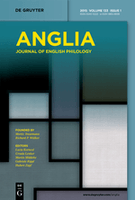
ANGLIA-ZEITSCHRIFT FUR ENGLISCHE PHILOLOGIE
Illuminating the Path of English Linguistic ResearchANGLIA-ZEITSCHRIFT FUR ENGLISCHE PHILOLOGIE, published by WALTER DE GRUYTER GMBH, stands as a significant periodical in the fields of Linguistics and Literary Theory. With a rich publication history dating back to 1878 and ongoing contributions until 2024, this esteemed journal serves as a vital resource for researchers, professionals, and students interested in the evolution of the English language and literature. Although it does not currently offer open access, its rigorous peer-reviewed articles have secured a respectable standing, ranking Q3 in Linguistics and Language and Q2 in Literature and Literary Theory as of 2023. The journal, located in Berlin, Germany, continues to drive academic discourse and foster scholarly engagement in the intricacies of English philology, making it an essential platform for the latest research and developments in the field.

Valenciana
Connecting emerging voices with global perspectives.Valenciana is an esteemed, peer-reviewed journal published by the University of Guanajuato, dedicated to advancing scholarly discourse in the fields of humanities and social sciences. Since its inception in 2008, this Open Access journal has facilitated unrestricted access to high-quality research, fostering collaboration and innovation among researchers, professionals, and students. With an ISSN of 2007-2538 and an E-ISSN of 2448-7295, Valenciana is committed to publishing original research, reviews, and theoretical contributions that illuminate contemporary issues and cultural phenomena. The journal not only serves as a platform for emerging voices in academia but also enhances its visibility in the global research landscape, driving interdisciplinary dialogue and engagement. Situated in Guanajuato, Mexico, Valenciana embraces the rich academic heritage of the region while also appealing to a broader audience, making it a vital resource for those seeking to explore new ideas and perspectives in their respective fields.
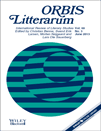
ORBIS LITTERARUM
Illuminating Texts Across Cultures and EpochsORBIS LITTERARUM, published by Wiley, is a prestigious journal in the field of Literature and Literary Theory, aiming to foster in-depth scholarly discussions and critical analyses of literary works and their theoretical underpinnings. With its ISSN 0105-7510 and E-ISSN 1600-0730, the journal presents a rich legacy that spans several decades, having converged its publishing efforts from 1943 to 1950 and from 1954 to the present day, thus ensuring a continuity of discourse in the literary field. Recognized for its high quality, ORBIS LITTERARUM is ranked in the Q2 quartile of literature disciplines as per the 2023 metrics, placing it within the top 26% of its category and earning a favorable position in the Scopus Rankings with a percentile of 74 in the arts and humanities. Researchers, professionals, and students alike are encouraged to contribute to this esteemed journal to engage with contemporary literary debates and to influence future scholarship in literature, enhancing understanding of texts across cultures and epochs.
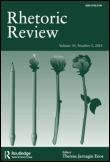
Rhetoric Review
Elevating Conversations in Rhetoric and Literary TheoryRhetoric Review, published by Routledge Journals, Taylor & Francis Ltd, serves as a vital platform for scholars in the fields of Rhetoric, Linguistics, and Literary Theory. Established in 1982, this esteemed journal presents a blend of theoretical frameworks and empirical studies that advance our understanding of rhetorical practices across diverse contexts. It holds a prestigious Q1 ranking in Literature and Literary Theory and a Q2 ranking in Linguistics and Language as of 2023, reflecting its influential role in shaping contemporary discourse in these disciplines. With an impressive Scopus rank of #85 out of 1106 in Literature and Literary Theory, Rhetoric Review is a go-to resource for researchers, professionals, and students aiming to explore the intricacies of language and communication. While the journal is not open access, it offers a comprehensive range of articles, reviews, and theoretical discussions that contribute significantly to both academic scholarship and practical applications in rhetoric. The journal’s commitment to publishing pioneering research ensures its relevance in an ever-evolving academic landscape.
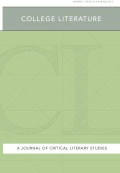
COLLEGE LITERATURE
Empowering Educators and Researchers in Literary StudiesCOLLEGE LITERATURE, published by the Johns Hopkins University Press, is a renowned journal dedicated to advancing the field of literary studies and education. With its ISSN 0093-3139 and E-ISSN 1542-4286, the journal spans a historic timeline from 2002 to 2024, highlighting its ongoing commitment to scholarly discourse. Although it operates under a traditional publishing model without open access provisions, it maintains a significant presence within academia, placing in Q3 in Literature and Literary Theory and Q4 in Education as of 2023. The journal ranks #277 out of 1106 in its category, reflecting its reputable standing in the 74th percentile within the Scopus database. With a strong focus on critical literary analysis and educational methodologies, COLLEGE LITERATURE serves as a vital resource for researchers, educators, and students seeking to deepen their understanding of literature's role in society. Its comprehensive approach ensures a broad spectrum of perspectives and insights, fostering a rich academic environment that engages and challenges its readership.

CESKA LITERATURA
Bridging Tradition and Innovation in Czech Literary AnalysisCESKA LITERATURA is a prestigious peer-reviewed journal dedicated to the exploration and analysis of Czech literature and its role within the broader spectrum of literary theory. Published by the Czech Academy of Sciences, Institute of Czech Literature, this journal has established itself as a vital resource for scholars and practitioners in the field since its inception. With an impact factor that reflects its influence, CESKA LITERATURA provides open access content since 2021, ensuring wider dissemination and accessibility of research findings. The journal aims to foster interdisciplinary dialogue and engage with contemporary literary discourse while covering a range of topics from historical studies to modern literary critiques. With a proud heritage from 2002 to 2024, CESKA LITERATURA holds a notable position, categorized in the Q3 quartile in Literature and Literary Theory for 2023, and ranked #458 out of 1106 in the Scopus database, highlighting its relevance and contribution to the arts and humanities domain. Scholars and students interested in deepening their understanding of Czech literature and contributing to its ongoing discussion are encouraged to explore the rich array of articles and insights available in this important publication.
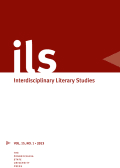
Interdisciplinary Literary Studies
Fostering Dialogues Across Literary DisciplinesInterdisciplinary Literary Studies is a prominent journal published by Penn State University Press that delves into the rich and diverse field of literature and literary theory. Established to foster scholarly dialogues, this journal embraces an interdisciplinary approach, making it a valuable resource for researchers, practitioners, and students interested in the multifaceted dimensions of literature. With an ISSN of 1524-8429 and an E-ISSN of 2161-427X, the journal operates without open access, reflecting its commitment to maintaining rigorous academic standards. The journal is ranked in the Q3 quartile of literature and literary theory for 2023 and holds a Scopus rank of #730 out of 1106, placing it in the 33rd percentile, which further emphasizes its emerging stature within the academic community. Spanning converged years from 2017 to 2024, Interdisciplinary Literary Studies continues to impact the dialogue within the humanities, encouraging nuanced analyses and interdisciplinary connections that push the boundaries of literary scholarship. Set in the United States, the journal is dedicated to exploring contemporary and historical texts, critical theories, and diverse literary forms, making it an essential publication for anyone passionate about the evolving landscape of literature.